Does every company need a .COM? Or does an organization need a .ORG? What if your company is an organization, or your organization is a company? In any case, it’s not always clear which extension is best.
Domain extensions may seem like an afterthought, but they can say a lot about your website — and the one you choose can also have a big impact on your business.
Check Out Our Video Guide to .ORG vs .COM
While there are tons of domain extensions to choose from, most websites use either .ORG or .COM. Though most people would think to simply group companies with “.COM” and non-commercial organizations with “.ORG,” it’s not always such a clear-cut distinction. In fact, some companies may benefit from using a .ORG and vice versa.
But which domain extension is right for you? This article will compare .ORG vs. .COM and explore how each extension can impact a website. Read on to learn more and discover the right extension for you and your company or organization.
What Are Domain Name Extensions?
Also known as Top-Level Domains (TLDs), domain name extensions such as .ORG and .COM help categorize web addresses.
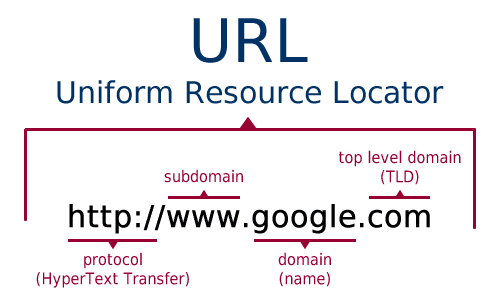
How Domain Name Extensions Work
A web address is more than just its name. When you enter a web address into your browser, your local Domain Name System (DNS) translates it from something readable like “kinsta.com” to a numerical IP address. For example, our main IP address is 104.18.0.153.
You probably wouldn’t want to type in an IP address whenever you want to visit a website (and neither would anyone else). That’s why we use domain names and DNS servers to make the process easier.
But just typing “google” or “kinsta” into your address bar would make it difficult to organize websites effectively. Enter TLDs like .ORG and .COM.
When you enter a domain name with a TLD like “google.com,” you’re addressing the second-level domain “google” associated with the top-level domain “.COM.” Short for “commercial,” .COM is intended to group all commercial-related websites under a single domain or category.
However, that’s not to say .COM is some big website you can visit. Instead, it’s more of a category that DNSs, web hosts, and Internet service providers (ISPs) use to keep the Internet organized. In addition to purpose-related categories like .COM and .ORG, other TLDs, such as .CO.UK, help associate websites with their geographic locations.
Of course, you don’t necessarily have to be “commercial” to register a .COM domain, just as you don’t need to be an “organization” to register a .ORG.
In fact, there are very few restrictions when assigning a TLD to a domain. The most common exceptions are some geographic TLDs (such as .CO.UK), which may require registration or hosting in the associated country. Similarly, .EDU domains are typically reserved for educational institutions.
Impacts of Domain Name Extensions
While you can register most extensions, the one you choose can impact your website in many ways.
Search Ranking
One of the biggest impacts is search ranking. While the importance of extensions and TLDs has varied over the years, they’re still a major factor in most people’s browsing habits. To this end, some extensions are better than others, with .COM usually being the most desirable.
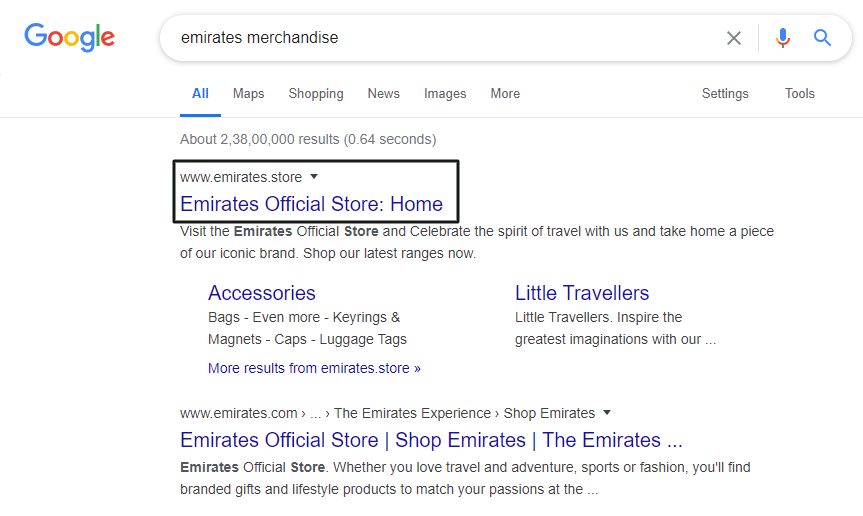
That’s not to say every website needs a .COM extension — or that every website would benefit from one. For example, .ORG domains may rank higher for nonprofit-related searches, while .EDU domains will rank higher for school-related searches.
Similarly, browsing in certain countries may cause “local” domains (such as .CO.UK or .AU) to rank higher in your search.
Interestingly, the latest search algorithms don’t use domain name extensions in their ranking (at least according to Google). So why will a “.COM” usually pop up before a “.STORE” or “.XYZ” extension?
The answer: User bias.
User Bias
While TLDs may not mean much to Google’s algorithms, they definitely mean a lot to you and me — even if we don’t always realize it. If we’re more inclined to click on a “.COM” address than a “.NET” address, then the .COM address will likely receive more traffic.
For example, imagine you’re a new parent searching for a car seat. As you probably care about the seat’s quality and safety, you place extra care in where you’re buying from. In the search results, you see the same top-rated car seat from two websites: “safetyseats.com” and “safetyseats.bid” (yes, “.bid” is a real TLD). Which one would you click on?
Most people would click on the “.COM” website. Though that’s a very particular example, we make many similar choices every time we search for something. Just as you’d choose “amazon.com” over “amazon.net,” most people do the same — and top search engine results show it.
Traffic
User bias when selecting search results ultimately impacts traffic. While the exact workings of Google’s ranking algorithm are kept secret from the public, it’s clear that traffic is the major variable in ranking high — not necessarily a website’s TLD.
However, as we’ve mentioned, TLDs directly impact traffic and, therefore, search rankings. The opposite also becomes true over time, as long-established rankings greatly impact traffic.
While we’ve covered many impacts of choosing a certain TLD, all of them can be condensed into a single one: Authority.
Authority
Whether it’s search rankings or traffic, a website’s authority is what drives its success. Though many things can impact a website’s authority, domain name extensions can make an impact.
Consider some of the examples we’ve covered already. From choosing “safetyseats.com” over “safetyseats.bid” to almost automatically navigating to “amazon.com” instead of “amazon.net,” it’s clear that domain name extensions play a major role in how we view a website’s authority.
As a result, choosing the right domain extension or TLD is key to establishing a website’s authority, search rankings, and so on. While most people choose either .COM or .ORG for this reason, there’s plenty more to choose from.
Most Popular Domain Name Extensions
While most websites are either “.COM,” “.ORG,” or “.NET,” there are way more domain extensions than meet the eye — over 1,500, in fact!
With TLDs ranging from .COM to .COACH, there’s truly a TLD for nearly every use case. The Internet Corporation for Assigned Names and Numbers (ICANN) maintains these names, which you can see here.
Though it may be tempting to choose something like “.pizza” for a pizza shop, it’s still best practice to choose among the leading extensions. As of January 2022, the top domain name extensions in the world are:
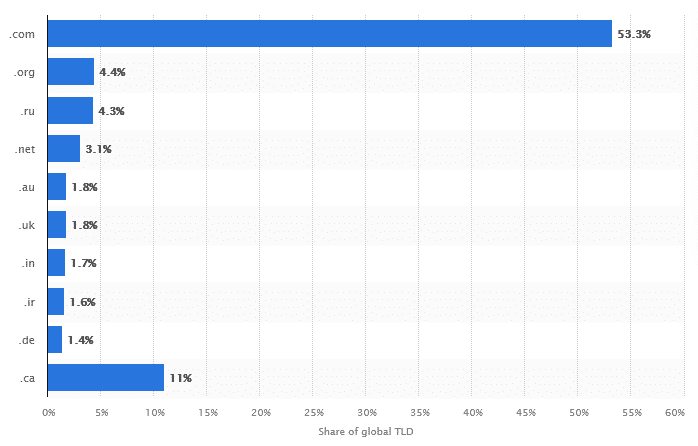
Note that “.pizza” isn’t on this list.
More importantly, .COM reigns supreme. Accounting for over 50% of all websites, most people choose .COM extensions for the instant authority and brand versatility it provides.
Again, you don’t need to be a “commercial” entity to register for a .COM. However, nonprofits and similar organizations may want to choose a .ORG instead. But with .ORG accounting for less than 5% of all websites, why not just go with a .COM? And what’s the difference, anyway? Read on to find out.
.ORG vs .COM Domains: What’s the Difference?
Though .COM is overwhelmingly more popular than .ORG, they both are popular, trusted, and easily recognizable TLDs.
And it’s no wonder, either. With most websites being either commercial entities or nonprofit organizations, most people choose either one or the other.
But there’s more to ORG vs. COM than a website’s intent or for-profit status. With many for-profit businesses now also registering .ORG domains, some differences are becoming blurry while others have become more obvious. Let’s take a closer look at the difference between these two.
.ORG Domains Are More Available
.COM’s overwhelming popularity has made it difficult to find good domain names with the extension. With many desirable domains either in use, parked, or claimed by “domain squatters” (more on these later), many people turn to other extensions to get the name they want.
With far fewer .ORG domains taken, it’s often a great alternative. While most people still associate .ORGs with nonprofits, some companies have been able to leverage parts of their brand to fit the identity. Of course, choosing a .ORG is a no-brainer for charities and nonprofits.
Apart from name selection, another benefit of .ORG’s availability is the price. Where the price of .COM domains rarely budge, .ORG domains are often on sale.
.COM Domains Are More Mobile Friendly
While both .COM and .ORG websites will work just fine on mobile devices, many mobile keyboards have a “.COM” key. With nothing similar available for other extensions, .COM is usually the best choice for websites expecting to receive high amounts of mobile traffic.
.COM and .ORG Are Both Credible (but For Different Reasons)
Both .COM and .ORG can lend credibility to a website — depending, of course, on the website itself. As you might imagine, an online store would be more credible with a .COM domain, just as a charity would be more credible with a .ORG.
Where both of these cases benefit from credibility, the opposite case wouldn’t be so beneficial. In other words, a charity may look questionable as a .COM domain, just as most people wouldn’t expect to buy anything from a .ORG.
.ORG vs .COM: Quick Summary
Let’s summarize. While many websites will be fine with either a .ORG or .COM extension, there are still some key differences to be aware of. Keep these in mind as you start shopping:
- .COM names are less available. Finding the domain name you want might be difficult, if not impossible. Some desirable names can cost thousands of dollars.
- .ORG is usually meant for nonprofits. While anyone can register for a .ORG, for-profit entities should make sure it’s appropriate for their brand and goals.
- .COM addresses are easier to type on mobile. Though not every browser has a .COM button, none of them have a .ORG button.
- .ORG names are less expensive. Though prices vary between registrars, .ORGs are usually a few dollars cheaper than .COMs.
Still not sure? Don’t worry. In the next section, we’ll run down some important considerations that will help you choose the right extension for you.
Factors To Consider When Choosing an Extension
Whether .ORG, .COM, or even .PIZZA, there’s a lot to consider when choosing a domain name extension. Consider these points before you make your next domain decision.
Availability
Even if you think of the perfect domain name, there’s a chance it’s already taken — especially if it’s a .COM. With over half of all websites registered under a .COM address, desirable domain names are becoming harder to come by.
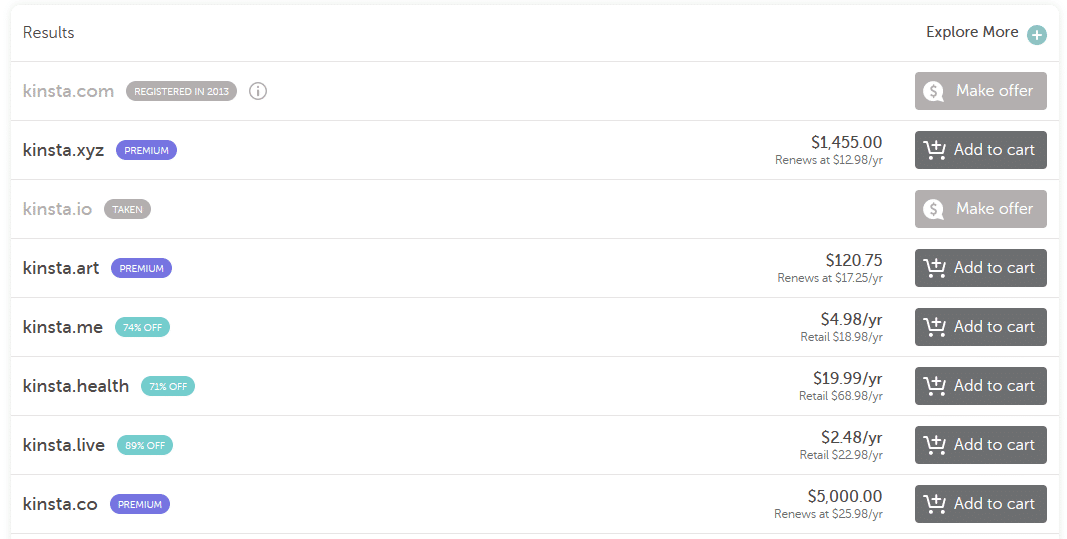
As a result, many people turn to .ORG, .NET, .CO, and other extensions. Some especially creative (or lucky) companies have also been able to incorporate their extension into their company name. For example, a company named “Kinsta Co.” might register “kinsta.co.”
If you’re really set on a name that’s already taken, you can sometimes buy it off the owner. It may also be listed for sale by a domain squatter, which is a person or company that registers domain names for the sole purpose of reselling them. Unfortunately, domain squatting has become a widespread practice, with many squatters charging thousands of dollars for even the most average .COM name.
You may need to contact the owner directly to try and buy it. In most cases, you can find a domain’s owner through a WHOIS (“who is”) search.
Relevance
Is the extension you’re considering relevant to you or your organization? While it doesn’t matter for personal websites, always consider whether .COM, .ORG, or any other extension truly fits with your company or organization.
For example, if you were building a website for a restaurant, then there would be no reason to register for a .ORG. However, if the .COM name was taken, other extensions such as .CO would be a good choice. In any case, you’ll want the meaning of the extension to be relevant to your needs.
Price
How much are you willing to pay for a domain? The right name with the right extension might cost more than you’d expect.
While most unregistered domain names sell for around $10, the price climbs quickly when they’re already taken — especially if it’s a .COM. For example, “voice.com” sold for $30 million in 2019. Though that’s an extreme example, aftermarket domains can cost anywhere from $100 to $30,000.
However, you can usually find a good name with a little creativity (or good luck). In any case, .COMs are generally the most expensive, with most registrars charging $10 to $15. .ORGs are usually slightly cheaper, while less common extensions usually cost well under $10.
Registrars almost always charge annually, though some offer discounts for multi-year subscriptions.
SEO
While domain extensions don’t directly benefit search engine optimization (SEO), they can influence other factors that do.
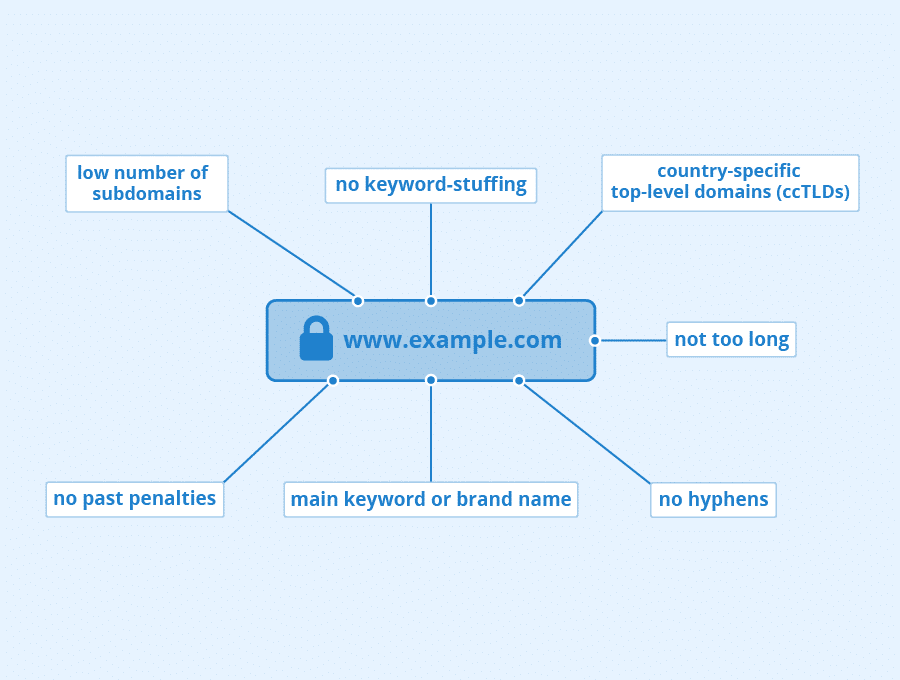
For example, some domain extensions may draw more traffic than others, resulting in better search rankings. Consider again the example of “safetyseats.com” and “safetyseats.bid.” As we covered, most people would feel more comfortable clicking the “.COM,” and that domain would likely perform better.
Ultimately, the domain name means more than the domain extension. According to Global Reach, the most SEO-friendly domain names are simple and avoid keyword stuffing. If choosing a .ORG over a .COM results in a better name, then .ORG may be the way to go.
You should also check if the domain has been used before. Using a name with a history of spam or illegal activity may result in poor search rankings.
Your Target Audience
Who’s your website for? Understanding your target audience is an important step in choosing an extension.
As we discussed earlier, the extension you choose can have a big impact on your website’s traffic. For example, is your target audience mostly mobile users? If so, you’d want to choose a .COM name for ease of typing in mobile browsers.
Your target audience may also expect (or trust) a certain extension. For example, online shoppers will likely navigate to a .COM, while people looking for information will likely prefer .ORG, .EDU, or .NET.
Your Brand Name
For most brands, the “holy grail” of domain names is brandname.com. However, with over 158 million .COM names already claimed, the holy grail is becoming, well, mythical.
However, that doesn’t mean there aren’t alternatives. Depending on your brand name, you can easily use a .CO or a local TLD (such as .CA in Canada) with no ill effect. Some companies with names ending in a “ly” even use the .LY extension.
If your brand name has an extension in it (such as expedia.com), then you’re pretty much tied down. In that case, however, it’s a good idea to secure your domain before settling on a brand.
Type of Business or Organization
Generally speaking, for-profit companies and stores should use .COM, and nonprofits and charities should use .ORG. Simple as that.
However, there are some exceptional cases. For example, software providers often use a .ORG if they’re open-source — even if they accept donations or other revenue. Read on to the next section as we explore more of these cases in detail.
When to Use .COM
While everyone can register a .COM, a .COM may not be for everyone. Here are the situations in which it works best:
- You’re a for-profit company or ecommerce store. The vast majority of for-profit or ecommerce properties are better off with a .COM address. However, alternatives such as .CO and local extensions are also acceptable.
- You want a general-purpose website. Though it’s intended for commercial purposes, .COM has always been somewhat of a “catch-all.” If you’re not sure of your website’s purpose or just want a domain for personal use, .COM is a great choice.
- You want a memorable domain name. .COM is the most immediately recognizable extension. As such, using a .COM will make it easier for users to remember your domain name.
- You cater to mobile users. With .COM built into many mobile browsers and keyboards, it’s a huge bonus for any mobile-facing website or online app.
When to Use .ORG
Here are the most common reasons to use .ORG:
- You’re a nonprofit or charity. Just like .COM and businesses, most nonprofits and charities are better off with a .ORG.
- You’re a source of information or research. .ORG is a great choice for websites providing information, research, and other data. A classic example is wikipedia.org.
- You’re open-source. Many open-source software projects use .ORGs. In fact, it’s often the preference.
- You want to establish trust and authority. No matter the website, .ORG is synonymous with trust and authority. While that can help boost credibility, websites should commit themselves to being credible before using a .ORG.
How To Make a Website with a .ORG or .COM Domain
No matter what extension you choose, the process for registering a domain and launching your website is the same.

Step 1: Pick a Domain Registrar
Domains are sold from special companies known as domain name registrars. To sell and register domains, a generic top-level domain (gTLD) or country code top-level domain (ccTLD) registry must accredit a registrar.
Thankfully, there are many domain registrars to choose from, such as Namecheap and GoDaddy. The best registrars offer low pricing, free WHOIS protection, and discounts for multi-year registrations.
Step 2: Register a Domain Name
Once you’ve found a registrar, use their search tool to find, register, and buy your domain name. You’ll usually need to set up an account and provide a form of payment.
When registering, be sure to check for multi-year discounts or hosting packages. You should also choose WHOIS protection, which will hide your personal information from domain registries.
Step 3: Pick a Web Host and CMS
Now that you have a domain name, it’s time to link it to a website. The first step is to rent server space from a web host.
Though there are many web hosts available, many registrars also offer hosting packages. Unless you have special hosting requirements, it’s often more convenient to buy hosting from your domain registrar. However, if you’re using WordPress, you’ll probably need managed WordPress hosting.
Finally, it’s time to go live! While there’s a lot involved in publishing a website, using a Content Management System (CMS) such as WordPress can simplify the process.
If you’re wanting to change your current domain extension, there’s a way to do that too. Check out our guide on how to change your domain.
Summary
While anyone can register a .COM or .ORG, the one you choose can make a big difference in the reputation you build. In most cases, for-profit companies and ecommerce stores should choose .COM, while nonprofits and open-source projects should choose .ORG.
No matter the extension you choose, however, you’ll need good hosting. From simple sites to full-scale enterprise solutions, Kinsta offers application, database, and managed WordPress hosting to fit all sizes and budgets.
Visit Kinsta.com or explore our managed hosting plans.
